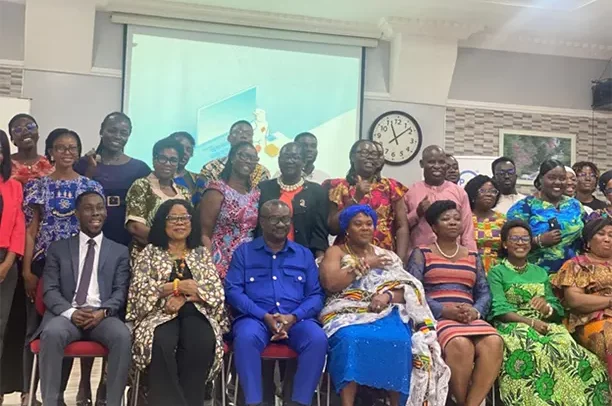Stakeholders at the workshop
The Ministry of Gender, Children and Social Protection (MGCSP) has reiterated the need for the creation of safer and more inclusive environments in tertiary institutions to prevent the growing cases of harassment and gender-based violence (GBV) on campuses.
Speaking at a two-day multi-stakeholder workshop in Aburi in the Eastern Region, Mrs. Ernestina Oduro, Senior Programme Officer at Ministry said creating a safe, inclusive and supportive tertiary institution is not the responsibility of one ministry or organisation, but requires collective ownership, commitment, and action from all stakeholders.
“Together we can build an environment where every student can thrive, free from fear, intimidation or harassment,” she said.
The workshop was attended by gender experts, university professors, civil society organisations, development partners, officers from the Domestic Violence and Victim Support Unit (DOVVSU) of the Ghana Police Service and student leaders from the University of Ghana, University of Cape Coast, Kwame Nkrumah University of Science and Technology (KNUST), University for Development Studies, and University of Education, Winneba.
The workshop, which was jointly organised by the POS Foundation, a Ghanaian civil society organisation and its international partner, Amplify Change, provided the platform for deliberations on the existing gaps between the universities’ frameworks on GBV against national legal standards and international best practices.
Mrs. Oduro noted that the Gender Ministry recognises the devastating impact that sexual harassment and gender-based violence have on individuals, families, and communities, particularly within tertiary institutions, which are meant to be safe spaces for learning and personal development.
“These acts not only violate fundamental human rights but also threaten the dignity, safety, and aspirations of our young people, especially women and girls,” she pointed out.
She commended the POS Foundation, Amplify Change, and all collaborating institutions for their sustained efforts in creating awareness and building stronger institutional responses across the nation’s universities.
Director of the Tertiary Education Division at the Ministry of Education, Dr. Emmanuel Newman, urged POS Foundation to extend the advocacy efforts to other tertiary institutions as well as the lower levels of education in the country.
He bemoaned the increase in harassment and GBV cases in schools, and suggested the adoption of modern technologies in fighting the menace, citing the KNUST’s online platform for reporting GBV cases discreetly.
Executive Director of the POS Foundation, Jonathan Osei Owusu, noted that bodily autonomy is a non-negotiable human right, emphasising that “consent is never a transaction, and no level of financial support, emotional manipulation, or academic mentorship gives anyone the right to another person’s body.”
He added, “Our young people must be empowered to say, ‘No’ to recognise coercion, and to stand up for their rights without fear of retaliation.”
A Field Consultant for the Foundation, Mercy Adjabeng, also observed that the prevalence of sexual assault and sexual harassment in Ghana’s universities continue to undermine the safety, dignity, and academic well-being of students and lectures; especially those from vulnerable and marginalised groups.
She added that urgent attention is needed to address significant gaps in policy awareness, resources for holistic support for survivors, and lack of confidence in institutional reporting and grievance systems for sexual misconduct.
By Gibril Abdul Razak


